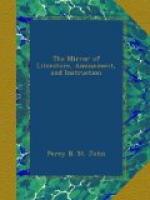The blow is struck—the lyre is shattered—the music is hushed at length. The greatest—the most various—the most commanding genius of modern times has left us to seek for that successor to his renown which, in all probability, a remote generation alone will furnish forth. It is true that we have been long prepared for the event—it does not fall upon us suddenly—leaf after leaf was stripped from that noble tree before it was felled to the earth at last;—our sympathy in his decay has softened us to the sorrow for his death. It is not now our intention to trace the character or to enumerate the works of the great man whose career is run;—to every eye that reads—every ear that hears—every heart that remembers, this much at least, of his character is already known,—that he had all the exuberance of genius and none of its excesses; that he was at once equitable and generous—that his heart was ever open to charity—that his life has probably been shortened by his scrupulous regard for justice. His career was one splendid refutation of the popular fallacy, that genius has of necessity vices—that its light must be meteoric—and its courses wayward and uncontrolled. He has left mankind two great lessons,—we scarcely know which is the most valuable. He has taught us how much delight one human being can confer upon the world; he has taught us also that the imagination may aspire to the wildest flights without wandering into error. Of whom else among our great list of names—the heir-looms of our nation—can we say that he has left us everything to admire, and nothing to forgive?
It is in four different paths of intellectual eminence that Sir Walter Scott has won his fame; as a poet, a biographer, an historian, and a novellist. It is not now a time (with the great man’s clay scarce cold) to enter into the niceties of critical discussion. We cannot now weigh, and sift, and compare. We feel too deeply at this moment to reason well—–but we ourselves would incline to consider him greatest as a poet. Never, indeed, has there been a poet so thoroughly Homeric as Scott—the battle—the feast—the council—the guard-room at Stirling—the dying warrior at Flodden—the fierce Bertram speeding up the aisle—all are Homeric;—all live—move—breathe and burn—alike poetry, but alike life! There is this difference, too, marked and prominent—between his verse and his prose;—the first is emphatically the verse of Scott—the latter (we mean in its style) may be the prose of any one—the striking originality, the daring boldness, the astonishing vigour of the style, in the Lay of the Last Minstrel, are lost in The Antiquary and Guy Mannering.
Scott may be said, in prose, to have no style. There are those, we know, who call this very absence of style a merit—we will not dispute it: if it be so, Scott is the first great prose writer from Bacon to Gibbon,—nay, from Herodotus, in Greek, to Paul Courier, in French—who has laid claim to it. For our own part, we think him great, in spite of the want of style, and not because of it. As a biographer, he has been unfortunate in his subjects; the two most important of the various lives he has either delineated or sketched—that of Dryden and that of Swift—are men, to whose inexpiable baseness genius could neither give the dignity of virtue nor the interest of error.




